Impact
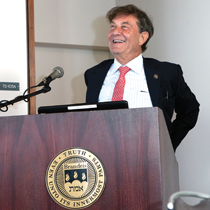
Alan Hassenfeld
Hassenfelds Give $2.5M for New Innovation Center at IBS
Brandeis International Business School (IBS) has received a $2.5 million gift to establish the Hassenfeld Family Innovation Center, which will build upon the university’s reputation as one of the nation’s leading research institutions by supporting faculty research while catalyzing innovation on campus.
Bruce Magid, P’15, the Brandeis IBS dean and the Martin and Ahuva Gross Chair in Financial Markets and Institutions, announced the gift on Nov. 7 during remarks at the Massachusetts Trade and Investment Forum alongside the state’s secretary of housing and economic development, Greg Bialecki.
The Hassenfeld Center will offer a platform for increased corporate outreach to leading-edge firms, provide new educational opportunities for Brandeis students, and leverage the experience of industry professionals to ensure that the societal impact of the university’s groundbreaking research is maximized.
It will also enhance efforts to bring Brandeis’ research and technology advances to commercial partners in the life-sciences, clean-energy and information-technology sectors, and serve as a platform to identify potential relationships with like-minded academic institutions and corporations around the globe.
“Massachusetts is a world leader in innovation, including through the extraordinary contributions of our Brandeis faculty, staff and students,” says President Frederick Lawrence. “We are grateful for this generous gift from the Hassenfeld family, which will ensure that the cutting-edge research conducted on our campus continues to make the greatest possible impact across the world.”
The Hassenfeld family’s deep connection to Brandeis began when Henry Hassenfeld, co-founder of the Hasbro toy company in Rhode Island, made a gift to the university soon after its founding.
Henry’s daughter-in-law Sylvia Hassenfeld, H’98, who died in August, served on the Brandeis Board of Trustees from 1996 to 2014. During that period, the family funded the Sylvia Hassenfeld Scholarship, the Sylvia K. Hassenfeld Chair in Islamic and Middle Eastern Studies, and the Hassenfeld Foundation Scholarship.
Two of Sylvia’s children, Alan Hassenfeld and Ellen Hassenfeld Block, have continued the family’s involvement with Brandeis. Alan, retired CEO of Hasbro, is co-chair of the board of overseers of Brandeis IBS and established the school’s Hassenfeld Emerging Markets Business Immersion Program. Ellen is a former member of the board of overseers of the Heller School for Social Policy and Management, and created a fellowship to support students.
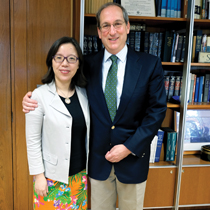
Lan Xue '90, MA'91, with President Frederick Lawrence
Wien Scholar Makes Million-Dollar Scholarship Gift
Lawrence A. and Mae Wien would be proud.
Lan Xue ’90, MA’91, whose Brandeis education was supported by the Wien International Scholarship Program, which the Wiens established in 1958, recently made a $1 million gift to support student scholarships at the university.
“Coming to the United States to pursue a college degree would not have been possible without the Wien scholarship,” says Xue, a leading financial analyst in her native China. “For the rest of my life, I will be grateful for the opportunity the Wiens gave me to attend a great university. I always thought that if I were in a position to help, I would really like to do what I could.”
Xue says her philanthropy was inspired by the example of her grandmothers, who supported a program that helped girls in rural China receive an education. Typically, if families in the Chinese countryside had money to educate their children, they supported their sons rather than their daughters.
“My grandmothers felt the only way to change a girl’s fate was to provide her an education,” Xue says. “They wanted to help the poorest girls become literate and have an opportunity to live a good life.”
“Lan’s gift is inspirational on many levels,” says President Frederick Lawrence. “Just as Brandeis helped fulfill her grandmothers’ dream and changed Lan’s fate through education, now she will help us change the fate of other deserving young scholars for years to come. Her gift will enable us to maintain our foundational commitment to ensuring that a Brandeis education is accessible and affordable to all. We are enormously grateful.”
Although Xue’s family was somewhat familiar with the West — one grandfather graduated from England’s University of Manchester, and her father, a rocket scientist, was a visiting scholar at MIT — she nevertheless experienced culture shock when she arrived on the Brandeis campus.
“Now the Chinese speak fluent English and frequently watch American movies,” she says. “For us in the 1980s, it was completely different.”
Coming to Brandeis with the intention of studying computer science, Xue switched her major to international economics and finance. She thrived in Brandeis’ small classes and developed close relationships with a number of faculty. A recipient of the Carol Ann Steinfeld Memorial Prize, Xue was selected to speak at the economics department’s mini-commencement ceremony in 1990.
She launched her career in financial services at Shearson Lehman in 1991, when Wall Street was still dominated by men. She returned to China in 1993 when its stock market opened and, in 1998, became head of China research at Merrill Lynch. Three years later, at age 33, she became the company’s youngest woman managing director. She left Merrill Lynch for Citi in 2002 and built the financial giant’s highly ranked China research team.
In 2010, she started her own hedge fund, which now has more than $1 billion in assets.
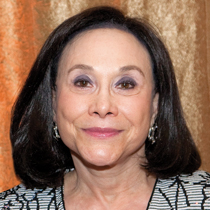
Nancy Winship, P'10, P'13
New Name, Same Quest
What’s in a name? To better reflect our critical role in advancing Brandeis’ academic and intellectual agenda, we recently decided to change ours.
The Office of Development and Alumni Relations is now known as the Institutional Advancement Division, reflecting our commitment to building an organization that fully integrates the essential functions of fundraising, alumni relations and advancement services in support of Brandeis’ mission. Institutional Advancement will continue to create a culture of philanthropy that sustains this remarkable university.
Our name may have changed, but our mission remains the same:
- Build strong, lasting relationships with alumni, parents and friends.
- Match donors’ interests with strategic institutional priorities.
- Broaden the university’s base of support.
- Secure the financial resources necessary for Brandeis to continue to achieve excellence in teaching, research and scholarship.
The development area, under the leadership of Myles Weisenberg ’78, vice president of development, oversees individual giving, annual giving, planned giving, corporate and foundation relations, and the Brandeis National Committee.
Patsy Fisher, vice president of alumni relations, heads our Alumni Association programming around the world, Brandeisians of the Last Decade (Bold), Reunions, Homecoming, volunteer management, and the Board of Fellows, and coordinates programs with the Hiatt Career Center.
Tim Cross, vice president of advancement services, leads our efforts in the areas of strategic planning, advancement communications, donor relations, prospect research and development, information systems and services, gift processing, donor and alumni records, talent management, and budget and resource allocation.
As always, Institutional Advancement will be guided by the fundamental values of integrity, collegiality, diversity, accountability, trust, and respect for our donors and their intentions.
With the help of our supporters around the world, I am confident that Institutional Advancement will continue to successfully support Brandeis in all its current and future endeavors.
Best,
Nancy Winship, P’10, P’13
Senior Vice President of Institutional Advancement
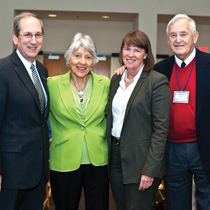
President Frederick Lawrence with Mary Ann, Lisa and Stanley.
Sachar Legacy Society Luncheon
More than 100 people visited campus for the annual Sachar Legacy Society luncheon, which featured a keynote address by Provost Lisa Lynch, the Maurice B. Hexter Professor of Social and Economic Policy. Fellows Stanley and Mary Ann Snider chaired the event. The Sachar Legacy Society is composed of individuals who have included Brandeis in their estate plans.
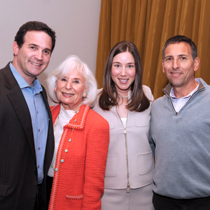
Brad Akers ’95, president of the Alumni Club of Chicago; Trustee Dolores Kohl ’55; Laura Neiman ’97; and Trustee Len Goodman served as event hosts.
Brandeis Philanthropy Ranks High in National Surveys
In both alumni giving and commitment to admitting students regardless of their financial need, Brandeis is making the grade.
According to U.S. News & World Report’s latest ranking of 280 national universities, Brandeis has moved up seven spots in alumni giving rate, to 19th.
The closely followed annual survey ranks universities on 16 indicators of academic quality, including the percentage of alumni who make gifts in a given year. Previously, Brandeis had been ranked 26th in this measure for each of the past two years.
“I am pleased our alumni continue to recognize the crucial role they play in sustaining the university and ensuring that Brandeis retains its unique character,” says Nancy Winship, P’10, P’13, senior vice president of institutional advancement. “In the years to come, alumni support will become even more important to achieving our institutional goals.”
In another recent survey, this one by The New York Times, Brandeis ranked eighth among national universities with the most economically diverse student bodies. The ranking was based on two factors: the share of freshmen from low-income families and the price of attendance for low- and middle-income families (adjusting for financial aid). All seven of the universities ranked ahead of Brandeis have significantly larger endowments than Brandeis does.
“Thanks to the help of our alumni and friends, Brandeis has been able to uphold its foundational commitment to educating the most promising students without regard to their ability to pay,” Winship says.
Securing funding for additional scholarship support for students continues to be Brandeis’ top fundraising priority.
